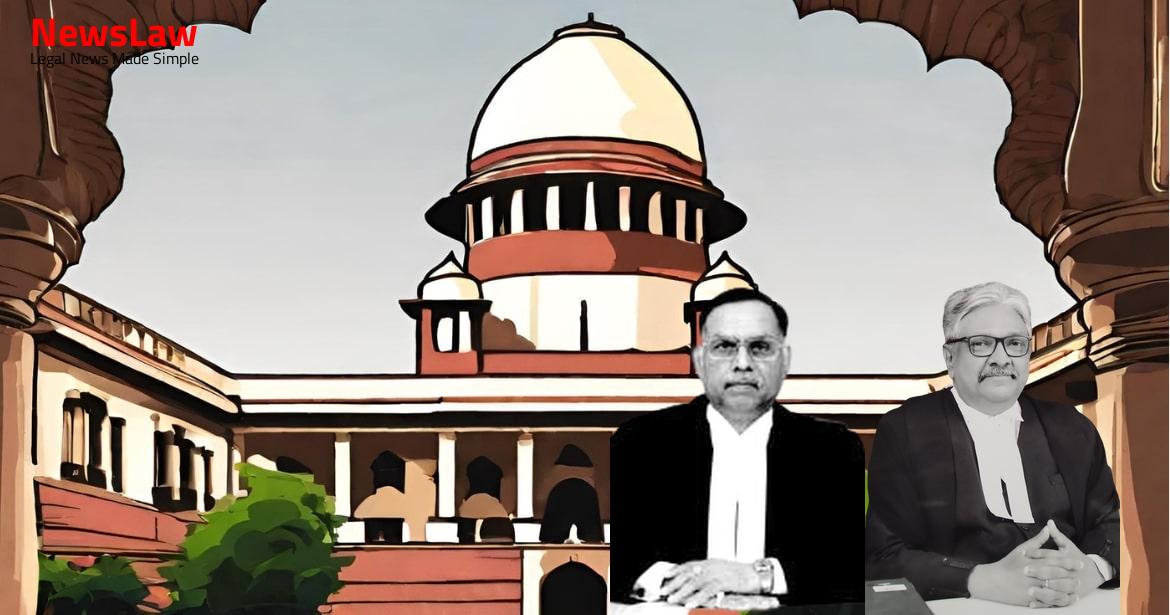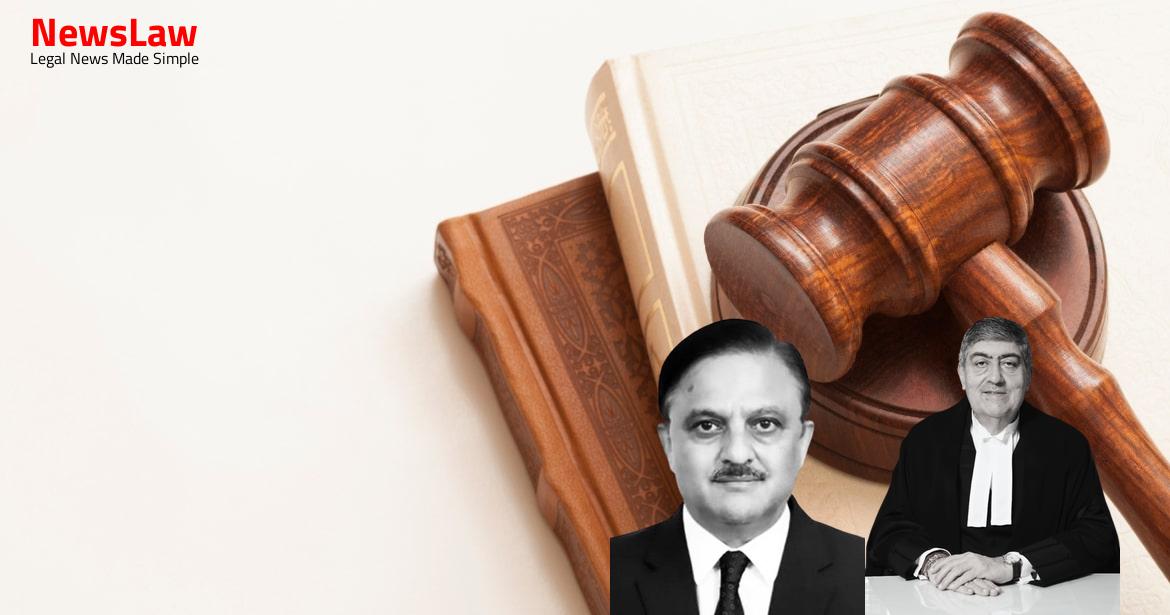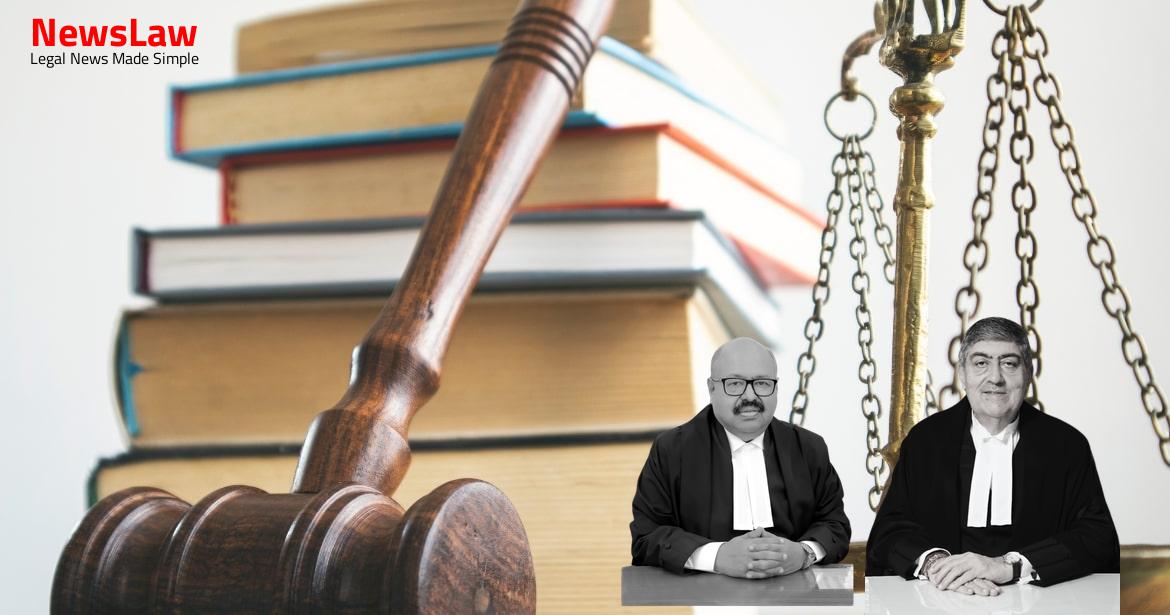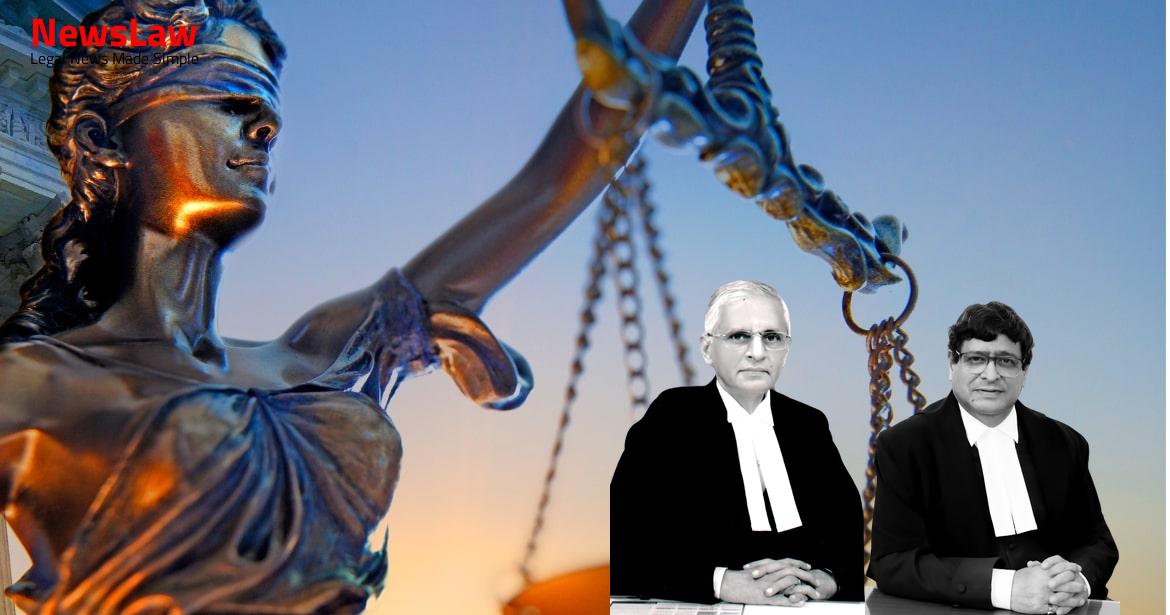Explore the intricate legal analysis regarding the court’s authority to alter judgments as per Section 362 of the Criminal Procedure Code. The case delves into the balance between the finality of court orders and the pursuit of social justice, showcasing how the law evolves to address changing societal needs. The court’s interpretation of statutes plays a critical role in advancing social justice legislation and bridging the gap between legal principles and societal welfare.
Facts
- The Court held that the order dated 06.05.2017 was conditional and subject to obligations not fulfilled by the parties.
- The Appellate Court was deemed to have no power to review or restore an appeal that had been disposed of.
- The Additional Principal Judge at the Family Court of Faridabad rejected the appeal on 16.07.2018 stating no grounds for interference.
- The High Court of Punjab and Haryana dismissed the appellant’s petition filed under Section 482 Cr.P.C. on 05.11.2019.
- Appellant was ordered to pay Rs.25,000/- per month towards maintenance of the respondents from July, 2015 to April, 2017.
- Appellant made a total payment of Rs.75,000/- only towards maintenance instead of the agreed amount.
- Respondent No.1 filed an application under Section 125(3) Cr.P.C. due to non-payment of arrears as per the settlement.
- Appellant objected to the application stating that payment was stopped as respondent backed out of the agreement.
- Order dated 06.05.2017 was set aside by the Family Court on 05.01.2019 to restore the petition under Section 125 Cr.P.C.
- Appellant filed a divorce petition against respondent No.1 on 14.10.2013.
- Arrears were to be paid within six months, but the appeal was dismissed.
- Application under Section 125 Cr.P.C. was filed by respondent No.1 on 09.07.2013 for maintenance of her and two minor children.
- Family Court disposed of the maintenance petition on 06.05.2017.
- Appellant paid maintenance only for four months from May, 2017 totaling Rs.1,00,000/-.
- Execution petition for enforcement of the maintenance order was filed by respondent No.1 in January, 2018.
- Appellate Court allowed the restoration of an appeal filed by the appellant.
- On reconciliation efforts, parties settled the matter amicably with recorded terms and conditions.
- Respondent No.1 filed an application to recall the order dated 06.05.2017 in July, 2018 after the execution petition was rejected.
- Appellant’s application under Section 482 Cr.P.C. was rejected by the High Court on 05.11.2019.
- The appellant filed the current appeal challenging the High Court’s order dated 05.11.2019.
- Appellant argues that the Family Court’s order dated 05.01.2019 is void as per Section 362 Cr.P.C.
- A criminal revision filed in the High Court was also dismissed.
- Payment of Rs.25,000/- per month was to be directly deposited in respondent No.1’s account before the 10th of each month from May, 2017.
Also Read: Interpretation of Lease Agreement and Compulsory Registration
Issue
- The only point to be determined in this appeal is whether the order passed by the Additional Principal Judge, Family Court dated 05.01.2019 setting aside the order dated 06.05.2017 and restoring the application under Section 125 Cr.P.C. was contrary to Section 362 Cr.P.C.
- Section 362 Cr.P.C. prohibits any Court from altering or reviewing its judgment except for correcting clerical or arithmetical mistakes.
Also Read: Enhancing Compensation and Modifying Sentences: A Legal Analysis
Arguments
- The High Court committed error in not setting aside the order dated 05.01.2019
- According to Section 362 Cr.P.C., the Court cannot alter or review the judgment except for clerical or arithmetical errors
- Shri Tej Pal Singh had jurisdiction to pass orders on the application but not to alter the judgment as per Section 369 of the Code
- Several judgments of the Court were relied upon by the appellant’s counsel in support of their submission
- The impugned order dated 05.01.2019 is without jurisdiction and violates Section 362 Cr.P.C.
Also Read: Exemption from Property Tax for Central Government-owned Buildings
Analysis
- Section 362 of Cr.P.C. prohibits the court from altering or reviewing its judgment, but exceptions are provided under Section 125(1), Section 125(5), and Section 127.
- Section 125(1) allows for the maintenance of wives, children, and parents by ordering a monthly allowance as deemed fit by the Magistrate.
- Section 125(5) empowers the Magistrate to cancel an order if the wife is living in adultery or refusing to live with her husband without reason.
- Section 127 allows for alterations in the maintenance allowance based on changing circumstances or court decisions.
- The Magistrate is not functus officio after passing an order under Section 125; they can exercise jurisdiction from time to time as needed.
- Inherent powers cannot be exercised to do what the Code specifically prohibits.
- Interpretation of law is viewed as the search for a pre-existing meaning in the legislator’s mind.
- Section 125 Cr.P.C. aims to provide relief to women becoming ‘wives’ in certain circumstances.
- Courts are restricted from altering or reviewing judgments unless expressly authorized by the Code or other laws.
- The legislative intent behind Section 125 Cr.P.C. is to fulfill constitutional duties in good faith for social justice.
- Inherent powers of the court cannot be used to go against the Code.
- Changes in law often reflect changes in social realities.
- The court has the power to grant relief under Section 125 Cr.P.C. and may alter or review orders as per the Code.
- Maintenance orders for wives, children, and parents are part of a continuous obligation enforced by law.
- Analogies and interpretations of statutes play a crucial role in social justice legislation under Section 125 Cr.P.C.
- The court discussed the interpretation of Section 362 and Section 482 of the Criminal Procedure Code.
- Reference was made to judgments in cases like Mostt. Simrikhia vs Smt. Dolley Mukherjee and Mahua Biswas(Smt.) vs Swagata Biswas for understanding social justice.
- The courts emphasized on advancing social justice and ensuring the proper application of laws like Section 362 regarding alteration or review of judgments.
- The role of the court in bridging the gap between law and society for achieving social justice was highlighted.
- Cases like State vs K.V. Rajendran emphasized the limitations on reviewing or altering judgments under Section 369 (now Section 362) of the Criminal Procedure Code.
- The court underscored the importance of discretion in determining the relationship between subjective and objective purposes of the law.
- The order passed by the Family Court reviving the maintenance application of the wife under Section 125 Cr.P.C. was deemed valid.
- The embargo contained in Section 362 Cr.P.C. does not prohibit the Family Court from setting aside the previous order and reviving the maintenance application.
- The submission that Section 362 Cr.P.C. prohibits the Magistrate from passing the order dated 05.01.2019 was not accepted.
- The High Court was justified in rejecting the application filed under Section 482 Cr.P.C. as per the inherent powers granted.
- The inherent powers of the High Court under Section 482 Cr.P.C. are meant to secure the ends of justice.
- The judgment of the Court aimed to avoid injustice to the wife in this case.
Decision
- The appellant was married to respondent No.1 on 04.11.1998.
- Two children were born out of their wedlock.
- The Family Court’s order dated 05.01.2019 was considered just in reviving the maintenance application of the wife.
- The High Court found no merit in the appeal and dismissed it.
- The respondent is directed to pay Rs.25,000 per month to petitioner no.2 and 3.
- He is also required to clear the arrears of maintenance within six months.
Case Title: SANJEEV KAPOOR Vs. CHANDANA KAPOOR (2020 INSC 215)
Case Number: Crl.A. No.-000286-000286 / 2020



